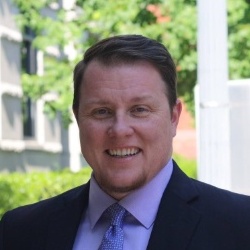Nathan Bruemmer J.D. ’17: Advocating for Equality
By Kai Su
Nathan Bruemmer spent 20 years advocating for equality and social justice before coming to law school. After graduating from Stetson University College of Law in May, he is preparing for his next role as an advocate.
On Aug. 7, Bruemmer will begin his position as executive director of the local nonprofit Advocacy Leadership Support and Outreach Youth. ALSO Youth is an LGBT organization based in Sarasota. Bruemmer was recently selected among “Most Remarkable People 2017” by Watermark magazine.
“If you had asked me my dream job five or 10 years ago, I probably would’ve described this,” Bruemmer said. “A job that combines my passion for working with children, advocacy, and LGBT equality.”
Bruemmer recently received an award from the Tampa Bay Business Journal for being a community voice. He was also featured in the Tampa Bay Times for his work beginning a tradition of kicking off the St Pete Pride Parade with a transgender march. He said there are needs everywhere for advocacy work.
“The last three years, the law has progressed in ways—the country has progressed in ways—politically, socially, and culturally that create a lot of interesting opportunities to do social justice work,” he said. “And as quickly as it’s expanded, things have started taking steps backward in I think potentially dangerous ways.”
Bruemmer said that during his 1L year at Stetson, Caitlyn Jenner’s story broke and the riots following police shootings in Ferguson and Baltimore occurred. During the summer before his 2L year, the marriage equality decision in Obergefell v. Hodges was announced and a transgender woman, India Clarke, was murdered in Tampa. Around that time, Bruemmer got involved in more projects and his advocacy work took off.
Bruemmer said law school has taught him how to be a better listener, which is the most important skill an effective advocate can have. He said it is important to be persuasive and passionate, but you must take the time to understand the people you are working with when advocating for different needs in different circles.
“And you can’t do that if you lead with your opening statement right out of the gate,” Bruemmer said. “The most persuasive thing—the thing that wins cases—you set up with an opening statement, but your closing argument is crucial. And the only way you win a closing argument is if you were really listening.”
Bruemmer said, as Professor Charles Rose teaches in Trial Advocacy, “situational awareness” is key.
“It’s about being in the moment and being aware and not being too prideful that your argument is the best…” Bruemmer said. “Finding the common ground to move the needle absolutely requires listening.”
Bruemmer, who has taught in six different schools in Hillsborough County, said the political climate was different when he started teaching in 1999.
“It was kind of a big deal to be LGBT and teaching 10 years ago,” he said. “People could lose their jobs.”
Bruemmer said bullying and mental health statistics were frightening. He never discussed his personal life as a teacher, but students would find their way into his classroom at lunch or after school because they needed a place to be. By working with a coalition of nonprofits, Bruemmer fought to convince school districts to implement changes as part of the Safe Schools Initiative, and the climate improved by the time he left teaching in 2009.
In addition to equality and education work, Bruemmer has advocated for the homeless, affordable housing, and veterans. He said his current advocacy work is mostly intersection-based, so he appreciates when people approach an issue from different perspectives.
“I don’t pretend that I know exactly all perspectives. I can’t know that.” Bruemmer said. “But when I do work for children or for the trans community in Tampa Bay, I can lead that conversation more eloquently and passionately.”
Bruemmer recalls passing through St. Louis, Missouri, on his drive to law school, right after the Ferguson shooting. His truck broke down, and the people who stopped to help Bruemmer talked to him about what had happened.
“I’m literally on my drive to law school, coming to law school to become a better advocate,” Bruemmer said, “and my first experience as I’m coming in is a social justice, eye-opening experience. So it just took off from there. I thought, ‘This is where I need to be at this point in history.’”
Bruemmer draws parallels between courtroom advocacy and advocating outside the courtroom for equal rights, but he said they are also quite different. There are rules in the courtroom, such as rules of civil procedure and evidence. There are also traditions and nuances—even expected dress and mannerisms. Advocacy work outside the courtroom is a lot more fluid, but there are still nuances and customs in the way things are done, he explains.
“I hope that more people are inspired to be advocates. It isn’t a zero-sum game where you have to be a traditional lawyer or an advocate,” Bruemmer said. “You can be some combination of all those things.”
Bruemmer said the best advice he got coming into law school was to stay grounded and to be open to new experiences. He said that having a plan and direction is helpful, but you have to keep enough room open to not limit yourself.
“If we’re drawn to law school, there’s a reason,” Bruemmer said. “We’re fighters. We’re all advocates for something.”
Post date: Aug. 7, 2017
Media contact: Kate Bradshaw
[email protected] | 727-430-1580
